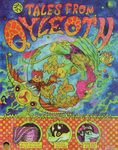
<<•>> edited by Dan Nadel <<•>> The long awaited follow up volume to Nadel's pioneering 2006 anthology of rarely seen and under appreciated comics, Art Out of Time, has at last arrived! This time around we have a tighter focus. While much of the work contained in Art of Time originally appeared in newspapers and broadsheets, all the work contained in this volume originally appeared in comic book form between 1942 and 1980. Extending and expanding his mission to bring art world curatorial standards to comics, Nadel has provided an informative introduction to the book as a whole, along with separate one-page explanations of the underlying reasoning behind each of the thematically groupings into which the work is divided: "Demand and Supply," "Where They Were Drawing From," "It's All In the Routine," and "Expansive Palettes." The artists included here range from the golden age superhero work of H.G. Peter and Mort Meskin, through the post-WW II "atomic age" genre work of Bill Everett, Matt Fox, Jesse Marsh and Pete Morisi, and also including early work focused on hardboiled detective, Sam Hill, by the one and only Harry Lucey, who is best know for his 1960s work on Archie Comics. Another artist whose work included here ranges far from their iconic work is John Stanley, who is best known for his multi-decade run Little Lulu. Nadel has dug up a couple of obscure horror tales from 1962 that should be quite a surprise to most Stanley collectors. Also from the 1960s we have Sam Glanzman's Kona and Pat Boyette's career high, the 25 page, "Children of Doom" from 1967. Heading into the underground era we have fairly obscure yet nonetheless era-defining work from Willy Mendes and John Thompson. And, finally, on the cusp of the undergrounds and the alternative revolution that supplanted them is Sharon Rudahl's 34 page epic, The Adventures of Crystal Night, is presented here in its entirety. Essential, we say.

One of the great masters of comic book art, Jesse Marsh is best remembered as the long-running artist on Dell's Tarzan comics (Marsh drew the first 153 issues, one of the longest unbroken runs in the history of comics). Here at Copacetic, while we do, of course, have a great and abiding respect for Marsh's work on Tarzan, it is his modest three-issue run on that other Edgar Rice Burroughs creation, John Carter of Mars, that has long been our favorite of his works. Marsh really shines here, with page after stunning page of fabulous work. He manages to combine a 'fifties SF sensibility with pop abstractions derived from modern art and his own classic comics language that he developed on Tarzan for a career high work that is magnetically attractive; you can get lost in the pages. This full color hardcover from Dark Horse contains good quality scans of every page of the original comic books, along with the front and back covers – and, thankfully, inside front and back covers as well. Our only criticism is Dark Horse's continual reliance on glossy coated stock. C'mon guys, wake up! These works were originally printed on newsprint. When you're printing scans of original comic book work, it needs to be printed on flat, uncoated, off-white stock. Dark Horse is clearly doing the work a disservice by printing the interior pages on glossy white stock. But this is a mere quibble next to the easy availability of this classic that this edition has now made possible. Enjoyment of this classic is now only a couple clicks away! Marsh's work was a fixture in the household of los hermanos Hernandez when they were growing up, and its influence is quite visible, in their work, especially that of Gilbert, whose line owes quite a bit to Marsh's (Gilbert's long focus landscapes and skyscapes are also very much indebted to Marsh's example), so it is quite fitting that the forward to this volume is by Mario Hernandez, the eldest, who would have likely been the one to have first brought these comics home and introduced them to his bros; and its inclusion more than makes up for the aesthetic damage of glossy stock. Here's hoping that this book is the success that it deserves to be, that it sells out and requires a second printing, and that the powers that be at Dark Horse wise up and select a more suitable paper stock for the second printing. This work is good enough that it would be worth buying again if they do!

Wow! Dark Horse really did it right this time and has produced a book worthy of the great Jesse Marsh art it contains. Their first (and, sadly, only) Tarzan Omnibus is a joy to behold. Collecting just shy of 700 pages of spectacular full color comics by the great Jesse Marsh and employing pitch perfect production throughout, this book is an instant Certified Copacetic Classic™.
These stories were all originally published in the Dell comic book series, Tarzan beginning in 1948 and running – for 206 issues (with the second half of the run published under the Gold Key imprint) – through to 1972, whereupon the license went to DC (and then, later, to Marvel). As to the stories themselves. They start out strong in the tradition of adventure comics in the early stories by Robert Thompson, but later, after the introduction – out of the blue, with zero explanation – of Jane, his wife, and Boy, his son, (an editorial edict, apparently; but, hey they were probably right, given that Tarzan ended up being one of Dell's longest running titles) the stories were penned by Gaylord DuBois and gradually morphed into coded domestic dramas in which the character of Tarzan becomes a paternalist/patriarchal figure who occasionally veers perilously close to that of an odious colonialist overlord, but, on other occasions, there are engaging and worthwhile philosophical ponderings. Most of all, there are a lot of beautifully illustrated and fun to read jungle adventures – some of which veer off into the completely fantastic – ancient Roman settlements come back to life, massive mythical birds take flight, dinosaurs roam the earth, and much, much more, all of which are spectacularly rendered by Jesse Marsh, with, once again, we must emphasize, the most saturated colors and best reproduction that one could possibly hope for, all together making for a truly amazing, one-of-a-kind volume.
Bonus Information: Marsh's art was a major infulence on Gilbert Hernandez, particularly noticeable in his landscape renderings.
Now, out of print :(... We have a small handful of copies remaining.










